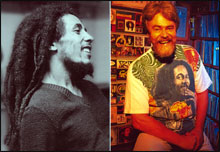Rastaman Vibration
Bugs Burnett
Bob Marley's old friend Roger Steffens resurrects the gospel according to Bob
Bob Marley (L) photographed by Roger Steffens, and Steffens (R).
Photos courtesy Roger Steffens
A couple of years ago I gave world-renowned reggae historian Roger Steffens a never-played 1970s U.K. cassette box-set of Bob Marley and The Wailers that had originally been given to me 25 years earlier by my British godfather.Over in Los Angeles, Steffens' Reggae Archives fill six rooms of his home, and contain the world's largest collection of Bob Marley material. Those archives will soon become the National Museum of Jamaican Popular Music in Kingston, Jamaica.
"Now you're part of the archives too," Roger told me.
Steffens - whom Bob Marley himself personally dubbed "Ras Rojah" back in 1979 when they travelled together - has chaired the Grammy Awards reggae committee for 22 years, hosted five radio shows on NPR, including the award-winning Reggae Beat that was syndicated to over 130 stations worldwide during the 1980s.
But Steffens is best known for founding The Beat magazine, his four books on Marley, including last year's indispensable Bob Marley and The Wailers - The Definitive Discography (which he co-wrote with Leroy Jodie Pierson), and his acclaimed international multimedia lecture The Life of Bob Marley, which he brings to the Montreal International Reggae Festival on the occasion of the 25th anniversary of the death of Marley.
"After Bob died, the biggest star in reggae was this salacious, foulmouthed, homophobic, misogynistic rapper called Yellowman, and it changed the whole tone of the music," Steffens explains. "The music turned so foul, so debauched, I decided
I didn't want to be around it any more."
About current dancehall dons Beenie Man, Sizzla, Buju Banton and others who call for killing gay people in some of their lyrics, Steffens notes ruefully, "The residual effect of all that publicity has harmed the careers of regular artists who do not harbour these feelings or sing these despicable lyrics. There are fewer [reggae concert] bookings around the world now because Jamaican music has been tarred with that broad brush of homophobia. It has pitted old artists against new artists. I think if Bob was still alive he'd be heartbroken because the music has been cheapened."
That's why Steffens also continues to lobby the Grammys to introduce a separate dancehall category. "It's not fair to put Burning Spear in the same category as Lady Saw. We didn't even want to put Sean Paul in the reggae category a couple years ago because it's a hip-hop album. On the other hand, it is what reggae has evolved into."
About touring with Marley, Steffens recalls, "My last day with him was at The Roxy [in L.A.]. He did a three-hour sound check and played all the instruments himself. Then he walked six blocks down Sunset Boulevard to Tower Records to sign records. He was the most approachable superstar I've ever known."
And Steffens has met them all, from Paul Simon - to whom he introduced Ladysmith Black Mambazo before he recorded Graceland ("And the rest is history") - to the French count Jean De Breteuil, who fled to Morocco with his then-girlfriend Marianne Faithfull the day after he sold Jim Morrison his fatal dose of heroin on July 3, 1971.
The next night, when de Breteuil told Steffens about Morrison's overdose, Steffens recalls, "I thought he was full of shit because there was nothing in the international press yet."
About the last living original Wailer, Steffens says Bunny Wailer has backed out of the biography Steffens had already spent years working on. "In Kingston he is known as Bunny Failure," Stephens says. "He is constantly bitter over everything, and I am bitter at him for failing his promise. It's unconscionable."
Earlier this year Steffens was also a witness in the London High Court case of Wailers bassist and bandleader Aston "Family Man" Barrett, who sued the Marley family and Island Records head honcho Chris Blackwell for $100-million in royalties. Sadly, he lost his case. "This is the man who co-created Bob's masterpieces in the 1970s. In reggae, bass is the lead instrument. It's not just rhythm, it's melody. Family Man invented those bass lines himself. Bob [also] gave the band 50 per cent of all his royalties because he knew they were co-creators, and that stopped the day Bob died," Steffens says. "Rita [Marley] stopped paying everybody."
With so many vultures still feeding off of Bob's carcass, is Steffens the real guardian of Bob's legacy?
"I don't want to sound pretentious in any way, but I've been made to feel that by The Wailers themselves," Steffens says. "They have given me so much material to safeguard. Maintaining [Bob's] legacy has not been a burden. It has been an honour and I feel blessed."

